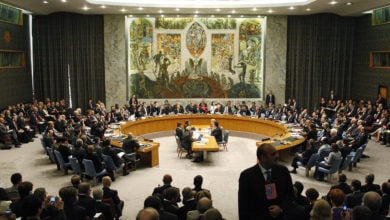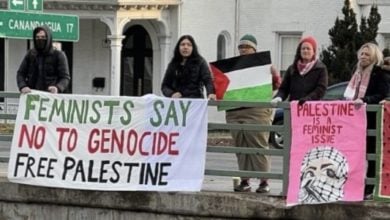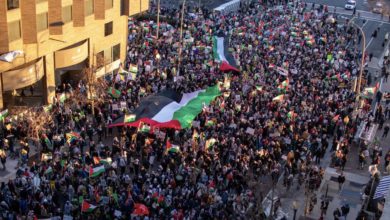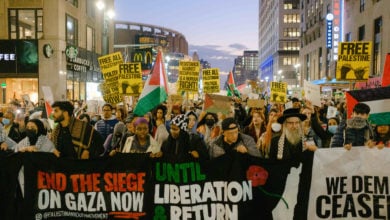Photo: Demonstrators in the West Bank wave Palestinian flag. Credit: Pixabay/hosnysalah
As Israel’s war on the people of Gaza approaches its fifth month, it is clear to the majority of people in the world that Israel’s actions constitute collective punishment and genocide against the people of Gaza — clear crimes under international law.
However, it is important to recognize that the oppression of Palestinians as an entire people is and always has been the central feature of Israel’s existence. We can call this reality — the oppression of a whole people based on their nationality — national oppression. By viewing Palestine in this way, we can better understand the political dynamics of the struggle within Palestine and gain more clarity on the role that the solidarity movement in the United States must play.
National oppression and Palestine
We should not view the struggle for Palestine, or any issue we care about, within a vacuum. Rather, we should understand the political reality in Palestine through a global and historical context. In many ways, Israel’s brutality in Gaza has been uniquely horrifying. But the colonial relationship between Israel and Palestine is not unique. Throughout the world, entire nations of people have faced national oppression. In some cases, national oppression manifests within the borders of a single country — think of the longstanding oppression of Black and Native peoples within the United States.
In other cases of national oppression, a colonial power will take complete control over a colony, while still treating the colony as a separate entity than the colonizing country. This is the primary form that national oppression took throughout the Middle East, Africa, Asia, and Latin America during the era of colonialism.
Palestine is a mix of both dynamics because the 1.6 million Palestinians who live within the borders of Israel — despite holding Israeli citizenship — are systematically oppressed by the Zionist regime, as are those Palestinians living in the Occupied Territories of the Gaza Strip, West Bank, and East Jerusalem. The former face institutionalized discrimination and exclusion as Israel denies them equal nationality and status, while Palestinians in the West Bank and East Jerusalem are subject to land theft, house demolitions, restrictions on movement, mass arrests, and severe repression for political dissent, among other things. In the case of Gaza, even before Oct. 7, Palestinians have been subject to a suffocating 16-year siege that destroyed their economy, along with indiscriminate bombing campaigns every few years at the hands of their Israeli occupiers.
The struggle for national liberation
In his prolific book “How Europe Underdeveloped Africa,” Guyanese Marxist Walter Rodney explains how national oppression removes a people from their process of historical development: “The removal from history follows logically from the loss of power which colonialism represented. The power to act independently is the guarantee to participate actively and consciously in history. To be colonised is to be removed from history, except in the most passive sense.”
We can see this clearly in the case of Palestine. It is impossible for Palestinians to fully grapple with questions of social and economic development while under the boot of Israeli oppression. How can Palestinians make an infrastructure plan when their schools, houses, and hospitals are at constant threat of being bombed or otherwise destroyed? How can they invest in social and cultural development when every day is a struggle for survival? How can they fully engage in politics when their day-to-day movement and fundamental rights are so thoroughly restricted by Israeli apartheid? How can they even begin the process of development, when Israel controls, whether directly or indirectly, nearly every aspect of the Palestinian economy?
Palestinians will only be able to fully engage with these questions, and reassert their ability to forge their own history, after overturning their reality of national oppression. We call this process national liberation.
Within national liberation movements, there are inevitably different ideological tendencies and organizations because no group of people is a monolith. But despite differences that exist in the movement, there is a fundamental understanding that the primary enemy is the oppressor, and that political differences between various groups in the national liberation movement can only truly be settled after national liberation is won.
Despite the corporate media’s shameless attempts to frame Israel’s current genocide as the “Israel-Hamas War,” Israel is truly engaged in a struggle against the entire Palestinian national liberation movement. After Oct. 7, all of the major political organizations in Palestine not only expressed support for the actions taken by the Palestinian Resistance on that day, but also called for an expansion of the struggle against Israel’s oppression. A poll conducted in December revealed that almost three in four Palestinians supported Operation Al-Aqsa Flood. Again, these groups and individuals have a wide range of ideological and strategic perspectives, but they are united under the banner of a national liberation movement.
The role of the U.S. movement
The U.S. government is a central force in maintaining the oppression of Palestinians due to its unconditional military, political, and diplomatic support for Israel. This gives the Palestine solidarity movement in the United States a particular responsibility. The role of the movement in the United States is not to critique the ideology or strategy of the Palestinian liberation movement, but rather to do our part to support Palestinians in overthrowing the yoke of colonialism so that they can decide for themselves how they wish to organize their society. That process of Palestinians reorganizing their society will likely include intense political struggles within Palestine, just as we have seen similar struggles within other countries that liberated themselves from national oppression. Again, it is not the role of the U.S. movement to try to direct the outcome of those struggles, only to support the Palestinians’ right to self-determination — or in other words, their right to reclaim their process of independent historical development and collectively shape their future.
This is not only a morally correct position for the U.S. movement but a strategic necessity. The capitalist class that supports and profits from the oppression of Palestinians is the same capitalist class that creates poverty, inequality, and insecurity within the United States. Thus, if those capitalists lose their domination over Palestine, the working class movement here will benefit. So too would the Palestinian liberation struggle benefit if those capitalists lose their domination over the U.S. working class. International solidarity is a necessary tool to build a strong working class movement on many fronts against a common enemy.
But genuine internationalism can only be forged on the basis of mutual respect between workers of different nations. If workers who live within imperialist countries try to dictate what workers of oppressed nations should do or believe, it undermines that respect. This is a crucial concept for U.S. workers in particular to grasp. The U.S. government positions itself as “policeman” of the world, and U.S. workers are inundated with propaganda designed to make us believe that it is our right and duty to intervene in the affairs of oppressed nations — a way of thinking that only serves the interests of U.S. imperialism and harms our movement.
But the cracks are showing. As the last five months of mass mobilizations, and most recently, the stunning sacrifice made by U.S. Air Force service member Aaron Bushnell have demonstrated, Zionist propaganda and the unwavering U.S. government support for Israel are wearing thin. The world is seeing Israel for the terrorist regime that it is, and it is up to the working class build a movement in the United States capable of channeling that anger toward ending our government’s support and military aid to propping up the Zionist state. The tide is turning, and the days of both Israel’s settler colonialist project and U.S. imperialism are numbered.






